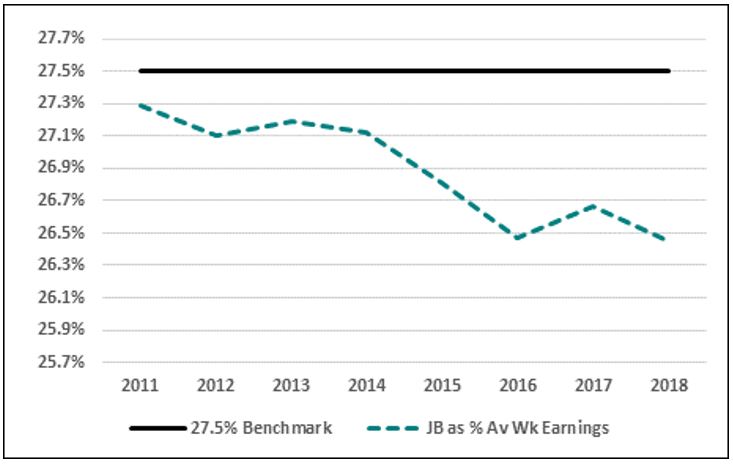Welfare rates should increase by €9 per week in Budget 2020

Adequate social welfare payments are required to prevent and address poverty. Without the social welfare system 43.8 per cent of the Irish population would have been living in poverty in 2017. Such an underlying poverty rate suggests a deeply unequal distribution of direct income. In 2017 social welfare payments reduced the poverty rate by 28 percentage points to 15.7 per cent.
In 2017 there were just over 760,000 people in Ireland living below the poverty line. Of these approximately 230,000 were children.
Budget 2019 delivered a welcome increase to the minimum social welfare payment. From March 2019 onwards it increased by €5 per week (to €203). This followed similar increases in Budgets 2017 and 2018. The Budget 2017 increase was the first increase to this payment since 2011.
A lesson from past experiences of economic recovery and growth is that the most vulnerable in our society get left behind unless welfare increases keep track with increases elsewhere in the economy. Benchmarking minimum rates of social welfare payments to movements in average earnings is therefore an important policy priority.
Just over a decade ago, Budget 2007 benchmarked the minimum social welfare rate at 30 per cent of Gross Average Industrial Earnings (GAIE). Today that figure is equivalent to 27.5 per cent of the new average earnings data being collected by the CSO. Applying this benchmark using CSO data for 2018 and ESRI projections for wage growth in 2019 (3.2 per cent) allows us to compare this benchmark with current welfare rates.
In 2019 the updated value of 27.5 per cent of average weekly earnings equals €212, implying a shortfall of €9 between current minimum social welfare rates (€203) and this threshold (see chart below). Minimum social welfare rates should increase by €9 per week in Budget 2020.

The new National Pensions Framework, entitled the Roadmap for Pensions Reform 2018-2023, notes that the state pension contributory payment should be ‘set at approximately 34/35% of average earnings’ (p5). Taking a similar approach to that outlined above for jobseekers benefit, in 2019 the updated value of 34/35 per cent of average weekly earnings equals €262.66/€270.38 implying a shortfall of between €14.36 and €22.08 (average €18.22) between current pension rate (€248.30) and this threshold.
As a means of closing this gap over the next two to three years, Social Justice Ireland believes that old age pension rates should initially increase by €9 per week in Budget 2020.
We believe Budget 2020 should also:
- Equalise Jobseekers rates for the under 26s at the increased rate of €212 per week;
- Increase the Living Alone Allowance by €5 per week;
- Increase Fuel Allowance rates to €24.85 (currently €22.50) in order to achieve purchasing power parity with 2010 levels, and reintroduce a 32 week payment period.